Spanish translation below /traducción en español abajo
A Kingston health clinic offers patients access to fresh locally grown vegetables
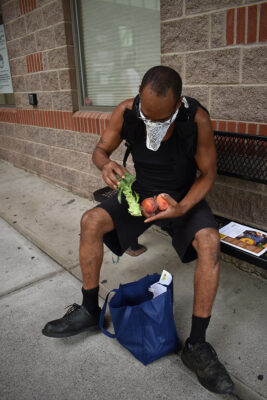
With access to fresh locally grown vegetables a continued challenge for many people, a new initiative at the Kingston Family Health Center offers patients easy access to ripe fruits and just harvested vegetables. Twice a month, patients who visit the clinic can pick up bags of free produce matched with recipes curated by Cornell Cooperative Extension of Ulster County.
KINGSTON – Frankie Lawyer’s recent trip to the Kingston Family Health Center was not exactly routine. He was greeted at the clinic entrance with a folding table packed with tote bags filled, to his surprise, with fresh vegetables. Peering inside, Lawyer discovered cauliflower and broccoli heads, a bowling ball sized squash (he’d later learn it was kabocha–a winter melon), tomatoes, garlic, peaches, and a carton of plums.
Smoothies are a favorite of the Kingston resident who boasts about his creations and his new blender.
“I make smoothies — all sorts of smoothies,” said Lawyer.
He loves vegetables; supermarkets are a go-to for vegetables but he’s limited by transportation. His main mode of transport is his bicycle and then taxi come winter. “This program is very helpful,” he said.
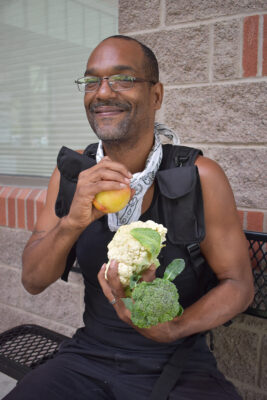
He was one of dozens of patients that morning who left the center after routine exams with a bag of produce. The 25 bags were rapidly gone. It is estimated that the bags feed some 40 individuals and 22 households.
The initiative, also known as the Local Produce Prescription Program, first launched in July at the Kingston Family Health Center.
Here’s how it works: patients can pick up a free bag of fresh produce when they visit the center. No questions asked. The bags include health information (some recent ones themed around diabetes or heart conditions), and a booklet of recipes curated to match the vegetables/fruits. Since its inception, the Hudson Valley Farm Hub and a handful of other farms in the region have consistently donated produce.
“The whole idea is to bring healthy food and fresh food, I also have patients who say ‘I don’t eat a single vegetable a week.’ Even to get them to get to eat one vegetable a week is a success,” says Asha Sarnacka a lead care navigator at the Kingston center, who came up with the idea for the program.
“It is one thing to tell people what they should eat but it’s another thing if they can’t afford it. We are teaching people how to eat well so they can take good care of themselves and their children. We are what we eat,” she says.
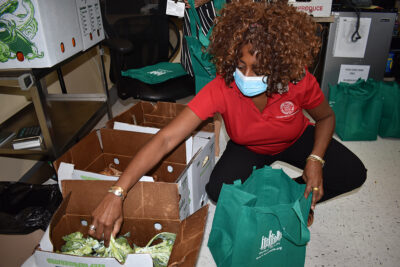
Earlier this year Sarnacka was given an opportunity to develop a special project. It did not take her long to come up with the idea of distributing fresh produce to patients fueled by personal passion and as a form of community outreach. She was driven to do so by her clients whose struggles include the basic necessities of food, housing, heat, water and often transportation.
The center, one of 30 in the tri-state area and mid-Hudson, is run by the Institute for Family Health with headquarters in New York City. The Institute’s website notes that its policy is to not turn anyone away even if they lack health insurance, and they work with a sliding scale. The majority of the 98,000 clients it serves tend to be members of the underrepresented community, many with disabilities and limited income. The Kingston center includes general practice, behavioral services and dental care.
This is not the first time the Kingston health center has engaged in free food distribution for patients. In 2020 it partnered with Kingston YMCA Farm Project to hold a “free farm stand,” which ran from July through October. The farm stand provided free vegetables for the community in response to the growing need for fresh and local food seen at the height of the COVID-19 pandemic. The produce was grown by the Farm Hub and Kingston YMCA Farm Project.
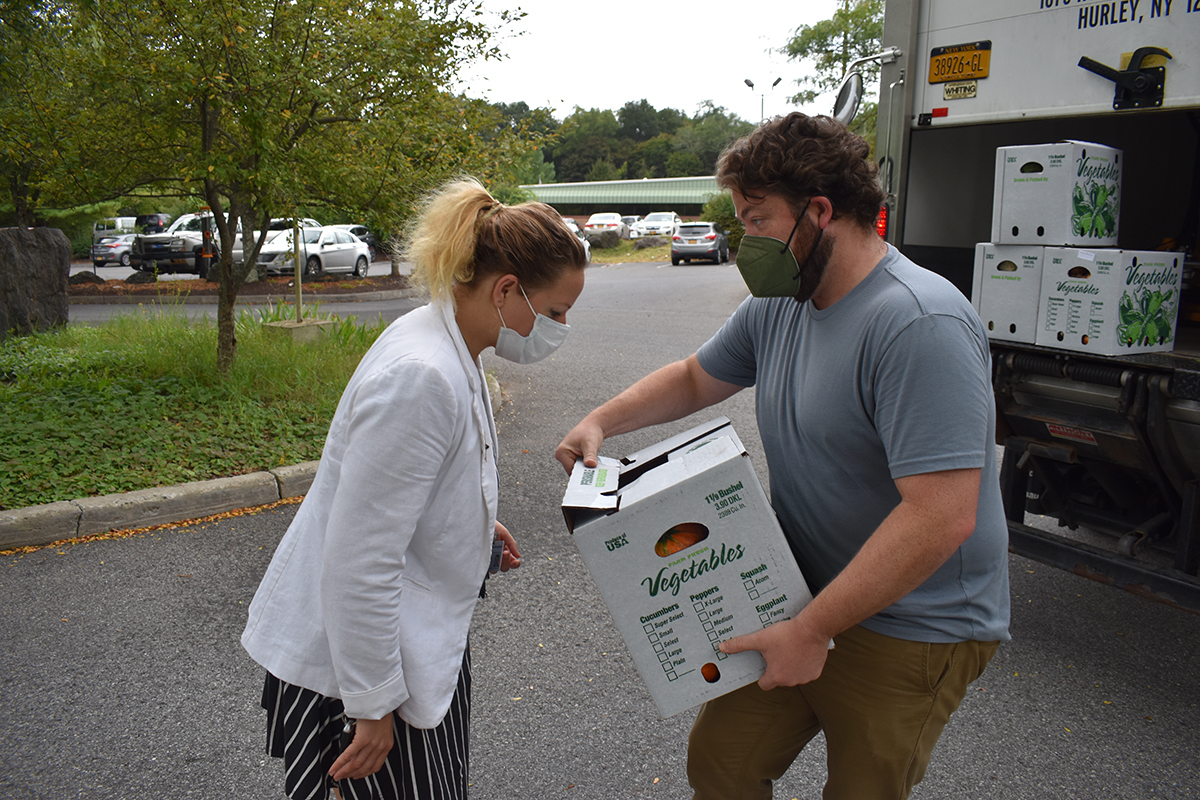
Sarnacka’s inspiration for the program came from seeing a need from her clients, and also seeing the opportunities to connect food programs with patients and patient navigators who could spread the word.
Sarnacka is a nutritionist by training, motivated by “sharing good food with community.” In 2019 she joined the Institute as a diabetic navigator and was promoted to lead navigator where she oversees dozens of caseloads. Many of the patients she serves have diets virtually void of fresh vegetables and fruits, especially organic.
After Sarnacka received the greenlight from her supervisor she went into action and started reaching out to farms in early 2021.
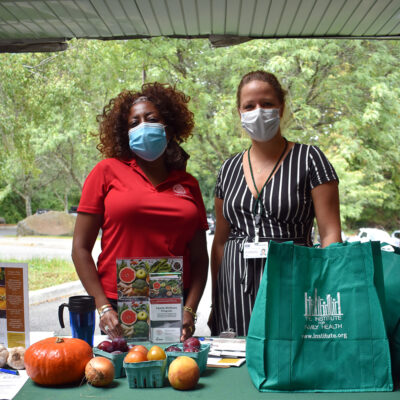
The Farm Hub responded enthusiastically to Sarnacka’s request for support. The Institute for Family Health is only one of dozens of organizations that the Farm Hub donates to on a regular basis. Others include Catholic Charities, Community Foundation, the Kingston YMCA Farm Project, Tilda’s Kitchen and People’s Place.
Jeff Scott, Distribution Manager at the Farm Hub, says the initiative aligns with the Farm Hub’s mission.
“One of our primary goals is to increase food access to food insecure communities here in the Hudson Valley,” Scott says. “While the majority of our donations are channeled into the emergency feeding system, for whatever reason not everyone who needs food is able to access that network of food providers. Partnering with the Institute for Family Health in this way allows us to extend our reach beyond the typical emergency feeding system and to get good, healthy food into the hands of people that need it most.”
As of the end of October the Farm Hub has donated 264,084 pounds of food, including vegetables, beans, corn and flour, to the emergency feeding system. All produce is certified organic.
With the goal of incorporating health and wellness into the program, Sarnacka also reached out to Marsha Sebro, the nutrition educator at Cornell Cooperative Extension of Ulster County (CCEUC), to partner on providing information on diet and nutrition to patients. Sebro sees the program as a win-win for all stakeholders.
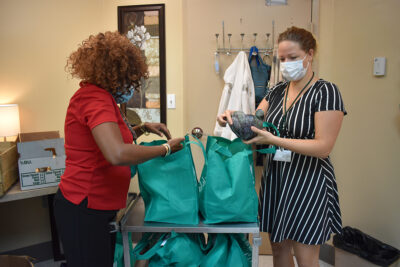
“With the support of Farm Hub and other area farms, I’m able to partner with IFH during their fruit & vegetable distribution. We offer healthy recipes and information on free nutrition lessons. Distributing fresh fruits and veggies at a healthcare site is a brilliant way to encourage patients to eat healthier. It reinforces wellness recommendations from their healthcare team, and they don’t have to make an extra trip to the supermarket,” Sebro says.
From the program’s beginning, the produce giveaway has been a success, and typically the stand draws a queue of people. During a visit all of the patients who we spoke with said they were pleasantly surprised to receive organic produce.
“It looks good, very nice,” says Cathy Malloy of Kingston as she peered inside the bag at the vegetables. “Organic is healthier, but organic is very expensive nowadays.”
As for the program, Sarnacka says she’s surprised by how quickly it has taken off.
“It’s working really beautifully,” says Sarnacka. “We wanted to build a community and people are very excited and very surprised. We see their beautiful smiles — we live in a world that there aren’t many opportunities where we get things for free.” In some cases, patients have turned down the free produce noting that they are in the financial position to purchase food and it might be better served giving it to someone in greater need.
A Vision
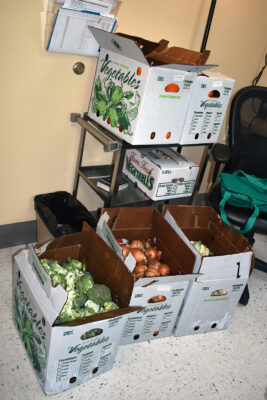
At least three other farms in the Hudson Valley region have joined the bandwagon to donate produce. On produce stand mornings, Sarnacka’s office transforms into a packing warehouse of sorts filled with crates of fruit and cardboard boxes of vegetables. Sarnacka bags vegetables along with colleagues amid banter and laughter.
The program will continue as long as there are donations; Sarnacka expects the need for vegetables will escalate during the winter months when transportation is most challenging.
“It’s great to have local partners who share our commitment to promoting the health of community residents,” says Dr. Wesley Ho, MD, medical director of the Institute’s Kingston Family Health Center. “The Farm Hub project supports an important goal of the Institute for Family Health and the Kingston Family Health Center — after all, so much of keeping people healthy happens outside of the doctor’s office, and fresh produce is an essential ingredient. We would love to expand this project to all of our centers.”
Sarnacka’s vision is that the initiative in Kingston will be year round and eventually incorporate nutrition education and cooking classes. And there are future plans to extend to other locations in the Hudson Valley.
A native of Poland, Sarnacka grew up in a culture where it was commonplace to shop for fresh food daily. Culturally there was an emphasis on fresh, locally produced and homemade foods. It is little surprise that gardening and cooking are her personal passions.
At home she and her 8-year-old son tend to the garden. She continues, “I truly believe in ‘do what I say see what I do,’ I am also a gardener and we eat from the garden and I love to cook and I understand how important it is to health.”
Finally, at the Kingston Family Practice a single bag of produce can also serve as platform for paying it forward. After the produce pickup in late September, Frankie Lawyer found success with a new smoothie recipe. “It was a plum, peach and apple smoothie and I gave some to my elderly neighbor, she loved it,” he says, eyes lighting up.

Michael Allocca, the unofficial chef at the Hummels Boarding Home for men in Kingston, picked up a couple of bags. The broccoli and cauliflower provided a base for a pasta dish and fruit was served for dessert.
“They liked it, it’s not what they are used to,” he says. A typical diet for many of the residents is “cereal in the morning, sandwiches in the afternoon and then the one hot meal.”
Of farm stand days, Allocca says, “it works out great and the guys love it, so when we see something like this it’s like a little gift for them.”
-Amy Wu
Note: The Local Produce Prescription Program runs every other Thursday at the Kingston Family Health Center, 1 Family Practice Drive, Kingston NY 12401
Una clínica de salud de Kingston ofrece a sus pacientes acceso a vegetales frescos locales.

Acceder a vegetales frescos de cultivo local sigue siendo un desafío para muchas personas, pero una nueva iniciativa del Kingston Family Health Center ofrece a los pacientes acceso fácil a frutas maduras y verduras recién cosechadas. Dos veces al mes, los pacientes que visitan la clínica pueden recoger bolsas de productos frescos gratuitos, junto con recetas seleccionadas por Cornell Cooperative Extension de Ulster County.
KINGSTON – La visita reciente de Frankie Lawyer a Kingston Family Health Center no fue exactamente de rutina. Al llegar a la entrada de la clínica le sorprendió encontrarse ante una mesa plegable llena de bolsas llenas de vegetales frescos. Al mirar en ellas, Lawyer vió coliflor y brócoli, una calabaza del tamaño de una bola de bolos (que luego aprendió que era kabocha–un melón de invierno), tomates, ajo, duraznos, y una cesta de ciruelas.
Los batidos son una de las cosas favoritas de este residente de Kingston, que nos habla de sus creaciones y su nueva licuadora.
“Yo hago batidos – todo tipo de batidos, dijo Lawyer, con brillo en los ojos.
Le encantan los vegetales; puede conseguir vegetales en los supermercados, pero tiene limitaciones de transporte. Su medio de transporte principal es su bicicleta y luego los taxis en invierno. “Este programa es muy útil”, dijo.

Fue uno de las docenas de pacientes que salieron del centro esa mañana después de sus citas de rutina con una bolsa de vegetales. Las 25 bolsas desaparecieron pronto. Se estima que las bolsas alimentan a unas 40 personas en 22 hogares.
La iniciativa, también conocida como el Programa de Receta de Vegetales Locales (Local Produce Prescription Program), empezó en Julio en Kingston Family Health Center.
Funciona así: los pacientes pueden recoger una bolsa de productos frescos gratuitos cuando visitan el centro. Sin preguntas. Las bolsas incluyen información de salud (algunos temas recientes fueron la diabetes o las afecciones cardíacas), y un folleto con recetas específicas para los vegetales y las frutas de la entrega. Desde sus inicios, Hudson Valley Farm Hub y algunas otras granjas del área han estado donando productos.
“La idea es traer comida saludable y alimentos frescos, también tengo pacientes que dicen ‘no como un solo vegetal en toda la semana’. Conseguir que coman un vegetal fresco a la semana ya es un éxito”, dice Asha Sarnacka, la asesora principal de atención en el Kingston Center que tuvo la idea inicial del programa.
“Una cosa es decirle a la gente lo que debe comer, pero es otra cosa si no pueden permitirse el costo. Estamos enseñando a las personas a comer bien para que puedan cuidar bien de sí mismas y de sus hijos. Somos lo que comemos”, dice.

A principios de este año, Sarnacka tuvo la oportunidad de desarrollar un proyecto especial. No tardó mucho en tener la idea de distribuir productos frescos a los pacientes, motivada por su pasión personal y como método de hacer alcance en la comunidad. Vio que era muy necesario para responder a las situaciones de sus clientes, que a menudo incluyen las necesidades básicas de alimentos, vivienda, calefacción, agua y, a menudo, transporte.
El centro, uno de los 30 en el área triestatal y en el Medio Hudson, está gestionado por el Institute for Family Health con sede en la ciudad de Nueva York. El sitio web del Instituto indica que su política es no rechazar a nadie, aunque no tenga de seguro de salud, y trabajan con una escala móvil. La mayoría de los 98,000 clientes a los que atiende tienden a ser miembros de la comunidad subrepresentada, muchos con discapacidades e ingresos limitados. El centro de Kingston incluye servicios de medicina general, servicios conductuales y cuidado dental.
Esta no es la primera vez que el centro de salud de Kingston distribuye alimentos sin costo para sus pacientes. En 2020 colaboró con Kingston YMCA Farm Project para establecer un “puesto de granja gratis”, que se extendió de julio a octubre. Esta tienda proporcionó verduras gratuitas para la comunidad para responder a la creciente necesidad de alimentos frescos y locales durante la intensidad de la pandemia de COVID-19. Los productos fueron cultivados por el Farm Hub y Kingston YMCA Farm Project.

Sarnacka tuvo la inspiración para este programa al ver la necesidad de sus clientes, y también al ver las oportunidades de conectar los programas de alimentos con los pacientes y los asesores de pacientes que podían difundir la información.
Sarnacka tiene formación como nutricionista, y la motiva “compartir buenos alimentos con la comunidad”. En 2019 se incorporó al Instituto como asesora sobre diabetes y fue ascendida a asesora principal, supervisando docenas de casos. Muchos de los pacientes a los que atiende tienen dietas en las que los vegetales y las frutas frescas, especialmente los orgánicos, están prácticamente ausentes.
Una vez que Sarnacka recibió la luz verde de su supervisor, entró en acción y comenzó a comunicarse con las granjas a principios de 2021.

El Farm Hub respondió con entusiasmo a la solicitud de apoyo de Sarnacka. El Institute for Family Health es solo una de las docenas de organizaciones a las que Farm Hub dona regularmente. Otras incluyen Catholic Charities, Community Foundation, Kingston YMCA Farm Project, Tilda’s Kitchen y People’s Place.
Jeff Scott, Gerente de Distribución de Farm Hub, dice que la iniciativa se alinea con la misión del Farm Hub.
“Uno de nuestros objetivos principales es aumentar el acceso a los alimentos para las comunidades con inseguridad alimentaria aquí en el Valle de Hudson”, dice Scott. “Si bien la mayoría de nuestras donaciones se canalizan al sistema de alimentación de emergencia, por diferentes razones, no todas las personas que necesitan alimentos pueden acceder a esa red de proveedores de alimentos. Colaborar con el Institute for Family Health de esta manera nos permite extender nuestro alcance más allá del típico sistema de alimentación de emergencia y podemos poner alimentos buenos y saludables en manos de las personas que más lo necesitan”.
Hasta finales de octubre, el Farm Hub ha donado 264,084 libras de alimentos, incluyendo vegetales, frijoles, maíz y harina, al sistema de alimentación de emergencia. Todos los productos están certificados como orgánicos..
Deseando incorporar la salud y el bienestar en el programa, Sarnacka también se comunicó con Marsha Sebro, educadora de nutrición en Cornell Cooperative Extension de Ulster County (CCEUC) para proporcionar información sobre dieta y nutrición a los pacientes. Sebro opina que el programa es un beneficio para todas las partes interesadas.

“Con el apoyo de Farm Hub y otras granjas del área, puedo colaborar con IFH en su distribución de frutas y vegetales. Ofrecemos recetas saludables e información sobre clases de nutrición gratuitas. Distribuir frutas y vegetales frescos en un centro de atención médica es una forma brillante de animar a los pacientes a comer de una manera más saludable. Refuerza las recomendaciones de bienestar del equipo médico, y no tienen que hacer un viaje extra al supermercado”, dice Sebro.
Desde el inicio del programa, el reparto de productos ha sido un éxito, y por lo general se forma una fila de personas en el puesto. Durante una visita, todos los pacientes con quienes hablamos dijeron que fue una buena sorpresa recibir productos orgánicos.
“Tiene buen aspecto, muy bonito”, dice Cathy Malloy de Kingston mientras miraba los vegetales dentro de la bolsa. “Lo orgánico es más saludable, pero lo orgánico está muy caro hoy en día”.
En cuanto al programa, Sarnacka dice que le sorprendió lo rápido que ha despegado.
“Está funcionando muy bien”, dice Sarnacka. “Queríamos crear comunidad y la gente está muy emocionada y muy sorprendida. Vemos sus hermosas sonrisas — vivimos en un mundo en el que no hay muchas oportunidades de obtener cosas gratis”. En algunos casos, hubo pacientes que rechazaron los productos gratuitos diciendo que están en una posición económica de comprar alimentos y que podría ser mejor que se los den a ora persona con más necesidad.
Una visión

Al menos otras tres granjas en la región del Valle de Hudson han subido a bordo para donar productos. Las mañanas de distribución, la oficina de Sarnacka se transforma en una especie de almacén de empaque lleno de cajas de fruta y de vegetales. Sarnacka prepara las bolsas de vegetales junto con sus colegas entre bromas y risas.
El programa continuará mientras haya donaciones; Sarnacka espera que la necesidad de vegetales aumentará durante los meses de invierno, cuando el transporte es más difícil.
“Es genial tener colaboradores locales que comparten nuestro compromiso de promover la salud de los residentes de la comunidad”, dice el Dr. Wesley Ho, MD, director médico del Kingston Family Health Center del Instituto. “El proyecto de Farm Hub apoya un objetivo importante de Institute for Family Health y de Kingston Family Health Center — después de todo, gran parte de mantener la salud ocurre fuera del consultorio del médico, y los productos frescos son un ingrediente esencial. Nos encantaría expandir este proyecto a todos nuestros centros”.
La visión de Sarnacka es que la iniciativa en Kingston dure todo el año y eventualmente incorpore educación nutricional y clases de cocina. Y hay planes futuros para extenderse a otros lugares en el Valle del Hudson.
Nacida de Polonia, Sarnacka se crió en una cultura donde comprar alimentos frescos a diario era común. En la cultura eran importantes los alimentos frescos, producidos localmente y caseros. No es de extrañar que la jardinería y la cocina sean sus pasiones personales.
En casa, ella y su hijo de 8 años cuidan su jardín-huerta. Dice, “Realmente creo en dar ejemplo, ‘mira lo que hago’. También soy jardinera y comemos de nuestra huerta y me encanta cocinar y entiendo lo importante que es para la salud”.
Por último, en Kingston Family Practice, una sola bolsa de vegetales también puede servir como punto de inicio para más beneficios. Después de recoger sus vegetales a finales de septiembre, Frankie Lawyer tuvo éxito con una nueva receta de batidos. “Era un batido de ciruela, durazno y manzana y le di un poco a mi vecina mayor, le encantó”, dice, con los ojos brillantes.

Michael Allocca, el chef no oficial en Hummels Boarding Home para hombres en Kingston, recogió un par de bolsas. El brócoli y la coliflor sirvieron de base para un plato de pasta y la fruta se sirvió de postre.
“Les gustó, no es a lo que están acostumbrados”, dice. La dieta típica para muchos de los residentes es “cereales por la mañana, sándwiches por la tarde y luego una comida caliente”.
De los días del puesto de distribución, Allocca dice: “Funciona muy bien y a los chicos les encanta, así que cuando vemos algo como esto es como un pequeño regalo para ellos”.
-Amy Wu
Nota: El Programa de Receta de Vegetales Locales se ofrece cada segundo jueves en Kingston Family Health Center, 1 Family Practice Drive, Kingston NY 12401
